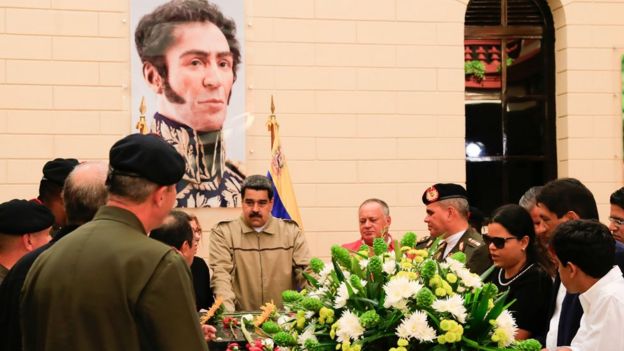
This article is more than
6 year oldIn a challenge to opposition leader Juan Guaidó, he has called for "anti-imperialist marches" on Saturday to coincide with anti-government protests.
Mr Maduro's comments were the first since Mr Guaidó defied him and returned to the country on Monday.
Meeting trade union leaders, Mr Guaidó told public workers to defy management orders and observe a partial strike.
As head of the opposition-led National Assembly, Mr Guaidó proclaimed himself Venezuela's interim president in January after the legislature declared Mr Maduro's re-election last year illegitimate.
He has accused the opposition of trying to organise a coup with US help.
Speaking at an event marking the sixth anniversary of the death of his predecessor and political mentor, Hugo Chávez, Mr Maduro said: "While a crazed minority continues with their hatred, with their bitterness, it's their problem. We won't pay attention to them, compatriots."
In front of gathered military personnel, he added: "We're going to stop them in their tracks, their work, the national union. Let the crazy minority continue with their bitterness, we'll defeat them. For Chávez we'll do it, for the great history of the country we'll do it."

Venezuela's political crisis has been sparked by an economic meltdown in which hyperinflation has hit salaries and savings, leading many to flee the country. The country is also suffering chronic shortages of basic items including food and medicine.
While international pressure on the president has steadily increased - more than 50 countries, including the US and most Latin American nations, have recognised Mr Guaidó as interim leader - Mr Maduro has dismissed all calls for him to step down.
Backed by China and Russia, Mr Maduro insists he is the only legitimate president.
His call for marches on Saturday sets the stage for more confrontation with Mr Guaidó, the BBC's Will Grant in Caracas reports.
Given the potential for clashes, the authorities will, no doubt, try to keep the two sides well apart, our correspondent adds.
On Monday, Mr Guaidó arrived back in the capital, Caracas, despite the threat of arrest after he defied a Supreme Court-imposed travel ban on leaving the country. He visited several Latin American countries to lobby for international help.
In talks with public sector unions on Tuesday, he has vowed to stage strikes to help bring down the government.
"They thought the pressure had already maxed out... They better know that the pressure has barely begun."